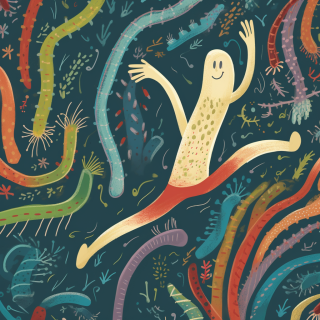Anxiety
A Brief History of Psychobiotics
Psychobiotic studies are only ten years old, but already producing results.
Updated September 29, 2023 Reviewed by Kaja Perina
Key points
- Psychobiotics are microbes that can improve your mood.
- The name was coined by Ted Dinan in 2013.
- In the ensuing decade, psychobiotic research has been growing and bearing fruit.
“We define a psychobiotic as a live organism that, when ingested in adequate amounts, produces a health benefit in patients suffering from psychiatric illness.” – John Cryan, Ted Dinan, and Catherine Stanton, 2013.

The connection between the gut and the brain is not exactly new. Hippocrates felt that all diseases, including brain diseases, started in the gut, and that was 2,500 years ago.
But Hippocrates didn’t know what a microbe was. That would have to wait a couple of millennia for Antonie van Leeuwenhoek’s tiny handheld microscope in the late 1600s. Then, in the late 1800s, the Russian zoologist Élie Metchnikoff discovered that long-lived Bulgarians consumed a lot of bacteria in the form of yogurt, and he postulated that this practice was the reason for their longevity.
The idea that lactic acid bacteria like Lactobacillus could contribute to health was the beginning of the concept of probiotics, but the details remained sketchy.
The modern gut-brain era
Then, at the dawn of the 21st century, things started to heat up. In 2004, Nobuyuki Sudo published an unassuming article on germ-free mice that was a shot in the arm to gut-brain research.
Sudo studied germ-free mice that had been raised in a sterile environment. He found that these mice had an abnormal response to stress. Somehow, bacteria – or the lack of them – had an impact on their behavior. Moreover, when he fed the mice bacteria to repopulate their gut, normal mouse behavior resumed. This striking connection between microbes and the mind set the field on fire.
Over the ensuing years, John Cryan and Ted Dinan, a pair of prolific researchers from University College Cork (UCC), proceeded to shed more light on the gut-brain axis. In 2013, Cryan and Dinan coined the term psychobiotic to refer to microbes that could improve mood.
A couple of years later, my wife and I met with the two of them in a lovely restaurant in Cork, where we ate fish and popped a bottle of Champagne to celebrate our agreement to write a book about their research. That book was ultimately published by National Geographic as The Psychobiotic Revolution.
How do psychobiotics work?
Psychobiotics use at least three chemical pathways to communicate with the brain: neurotransmitters, hormones, and immune factors.
Neurotransmitters
Amazingly, microbes produce neurotransmitters identical to those in our own brains. These include dopamine, serotonin, and GABA, which also happen to be targets of psychoactive drugs. The fact that microbes can directly produce feel-good neurotransmitters is sobering. These neurotransmitters are sensed by nerve cells surrounding the gut and then routed up the vagus, a nerve bundle that meanders through all of our organs on its way up to the brain. If you cut the vagus nerve, the psychobiotic effects evaporate.
Hormones
The hormone cortisol gives rise to the fight or flight response, and if you are running from a tiger, it’s appropriate. But relentlessly high cortisol levels can lead to brain fog, anxiety, and depression. Certain Lactobacillus and Bifidobacteria species can reduce cortisol levels, improving mood and cognition, thus making them psychobiotics.
Immune factors
Psychobiotic gut microbes help to keep the immune system on a low simmer. Beneficial gut microbes are tolerated by the immune system, the result of an educational process that begins in the newborn. Mother’s milk contains a starter kit of microbes for the baby. While breast-feeding, the immune system learns to give them a pass. Interference with this early education can lead to gut problems later in life.
These are three important psychobiotic pathways, but there are other backups. These tiny gut microbes have an outsized influence over our behavior. It begs the question, “Who is in charge?” It’s not an idle thought: as Cryan points out, “If microbes are controlling the brain, then microbes are controlling everything.”
Where we are today
The last ten years have solidified the importance of psychobiotics to our mental health and filled in many details. Specific psychobiotic bacteria have been identified, including:
Lactobacillus rhamnosus and Lactobacillus reuteri, which both reduce anxiety by affecting GABA levels. They work via the vagus nerve.
Bifidobacterium longum 1714, which tamps down cortisol levels. Cryan and Dinan found that “consumption of B. longum 1714 is associated with reduced stress and improved memory.”
Lactobacillus plantarum 299v, which reduces inflammation and helps to soothe IBS. By lowering cortisol levels, it lowers stress-related anxiety and depression.
Lactobacillus plantarum PS128, which has been shown, in limited studies, to improve attention and communication skills in people with autism spectrum disorder.
Gut and oral microbes have been found to be associated with many conditions over the past decade, including chronic fatigue syndrome, binge drinking, long covid, dementia, Parkinson’s, ALS, sleep disturbance, and antibiotic recovery.
The definition of psychobiotic has been extended to include heat-treated non-living bacteria that seem to work by encouraging the immune system to stand down. Also added to the definition: prebiotics, which are chains of sugars (oligosaccharides) that feed beneficial microbes. In particular, fructo-oligosaccharides (FOS) and galacto-oligosaccharides (GOS) are considered to have psychobiotic effects.
The last decade has shown that some kinds of depression and anxiety can be ameliorated or cured with psychobiotic treatments. Dinan has introduced them to his psychiatric practice with several heart-warming successes.
It’s hard to know how many psychiatric problems are due to gut issues, but a gut workup might not be a crazy way to start to a psych evaluation. The next ten years promise even more relief from stress-related disorders, among the biggest concerns of society today. Stay tuned!
References
Sudo, Nobuyuki, Yoichi Chida, Yuji Aiba, Junko Sonoda, Naomi Oyama, Xiao-Nian Yu, Chiharu Kubo, and Yasuhiro Koga. “Postnatal Microbial Colonization Programs the Hypothalamic-Pituitary-Adrenal System for Stress Response in Mice.” The Journal of Physiology 558, no. Pt 1 (July 1, 2004): 263–75.
Dinan, Timothy G., Catherine Stanton, and John F. Cryan. “Psychobiotics: A Novel Class of Psychotropic.” Biological Psychiatry 74, no. 10 (November 15, 2013): 720–26.
Ross, Kim. “Psychobiotics: Are They the Future Intervention for Managing Depression and Anxiety? A Literature Review.” Explore (New York, N.y.), February 20, 2023.
Allen, A P, W Hutch, Y E Borre, P J Kennedy, A Temko, G Boylan, E Murphy, J F Cryan, T G Dinan, and G Clarke. “Bifidobacterium Longum 1714 as a Translational Psychobiotic: Modulation of Stress, Electrophysiology and Neurocognition in Healthy Volunteers.” Translational Psychiatry 6, no. 11 (November 2016): e939.
Kaźmierczak-Siedlecka, Karolina, Agnieszka Daca, Marcin Folwarski, Jacek M. Witkowski, Ewa Bryl, and Wojciech Makarewicz. “The Role of Lactobacillus Plantarum 299v in Supporting Treatment of Selected Diseases.” Central-European Journal of Immunology 45, no. 4 (2020): 488–93.
Foster, Jane A., Linda Rinaman, and John F. Cryan. “Stress & the Gut-Brain Axis: Regulation by the Microbiome.” Neurobiology of Stress 7 (March 19, 2017): 124–36.
Mensi, Martina Maria, Chiara Rogantini, Michele Marchesi, Renato Borgatti, and Matteo Chiappedi. “Lactobacillus Plantarum PS128 and Other Probiotics in Children and Adolescents with Autism Spectrum Disorder: A Real-World Experience.” Nutrients 13, no. 6 (June 2021): 2036.
Kong, Xue-Jun, Jun Liu, Kevin Liu, Madelyn Koh, Hannah Sherman, Siyu Liu, Ruiyi Tian, et al. “Probiotic and Oxytocin Combination Therapy in Patients with Autism Spectrum Disorder: A Randomized, Double-Blinded, Placebo-Controlled Pilot Trial.” Nutrients 13, no. 5 (May 2021): 1552.
Liu, Yen-Wenn, Min Tze Liong, Yu-Chu Ella Chung, Hui-Yi Huang, Wu-Shun Peng, Yun-Fang Cheng, Yu-Siou Lin, Yu-Yu Wu, and Ying-Chieh Tsai. “Effects of Lactobacillus Plantarum PS128 on Children with Autism Spectrum Disorder in Taiwan: A Randomized, Double-Blind, Placebo-Controlled Trial.” Nutrients 11, no. 4 (April 2019): 820.




